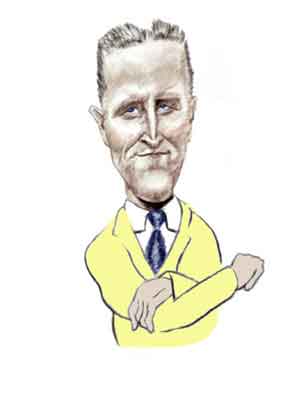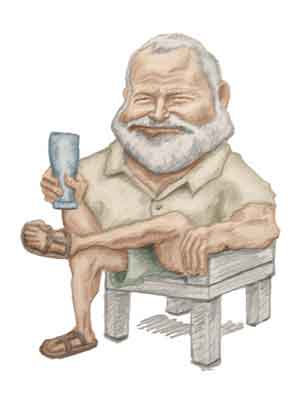
Scott Fitzgerald
If you're a post-baby boomer, you probably read Scott Fitzgerald because you were assigned to read The Great Gatsby, either in high school or college. But did you notice one thing? It really is a great book and has one of the most carefully crafted plots you ever read.

Scott Fitzgerald
But aside from writing a true American classic, Scott's equally lasting legacy is that he was responsible for giving a jump start to the career of a then-young Ernest Hemingway. Scott was already an established writer published by the prestigious Charles Scribner when he met Ernest in Paris. Scott had read some of Ernest's short stories (mostly published in the small Paris magazines funded not by subscription sales but by some rich "patron"). He mentioned Ernest to Max Perkins, the chief Scribner's editor. Max then wrote Ernest saying if he had any novels, he'd be happy if Ernest would send them in for consideration. But Ernest had just signed a contact to the far less prestigious (but in some ways more adventurous) publisher, Boni and Liveright. He was committed to them for at least three books. Ernest was then working on two novels, one he was calling The Torrents of Spring. The other, not as far along, had the intial working title Fiesta! But by the time it was nearly done, Ernest was calling it The Sun Also Rises.
The Torrents of Spring has to be one of Ernest's (or anyone else's) poorest novels although virtually everyone agrees Across the River and Into the Trees is even worse. It also parodied the writing of Sherwood Anderson, a then-famous but now largely forgotten writer. Sherwood, though, was one of Boni and Liveright's best known authors, making it virtually mandatory that they would return the manuscript. In the cable rejecting Torrents, Boni and Liveright said they were eagerly awaiting The Sun Also Rises.

"Papa" Hemingway
Publicly scourging his friends practically became a hobby.
There was, though, a loophole in Ernest's contract. If any book was rejected, the contract would be void, and he would be free to go to another publisher. So by first submitting a book to Boni and Liveright that was sure to be rejected (a book one of Ernest's friends called a "cold-blooded contract breaker"), Ernest would be free to go to Scribner's. That is, in fact, what happened. Ernest moved to Scribner's, who published both books.
The Sun Also Rises was actually a roman à clef where all the characters were based on Ernest's friends and acquaintances. The "villain" - Robert Cohn - was not based on Scott Fitzgerald as you might read. Instead Robert was modeled after the real life Harold Loeb, who like Ernest was one of the American expatriates living in Paris in the 1920's. Harold, it is interesting to note, had actually helped Ernest get set up with Boni and Liveright. Ernest's publicly scourging his soon-to-be former friends - and indeed people who had actually provided major support and help - almost became a hobby. In his later years, he began what was almost a vendetta against Scott.
At first Ernest's biographers accepted his stories about Scott as true history. However, there were warning signs for the wary. For instance, one person who Ernest claimed was at the first meeting with Scott was not there at all. Despite this signal (and Ernest's own statement that the vignettes is A Moveable Feast "could" be taken as fiction), Carlos Baker, Ernest's first academic biographer, wrote such discrepancies off as minor errors. However, one of Ernest's later biographers found that Ernest's contemporary correspondence, as well as that of Scott's, just do not jibe with what Ernest penned thirty years later.
What likely caused the final rift was in 1936 when Ernest made a reference to "poor Scott Fitzgerald" in his short story "The Snows of Kilimanjaro". Scott, who was suffering from the effects of alcohol and a horribly unhealthy lifestyle, sent a curt note to Ernest asking him to please lay off him in print. Although Scott praised the story and said Ernest probably meant the comment kindly, he didn't really want people publicly praying over his corpse. Ernest replied to Scott that he would write what he wanted and essentially told Scott to stuff it. Although Ernest always claimed his high regard for Scott, he started telling (and writing) his favorite Scott Fitzerald stories that inevitably made Scott look like a petulant spoiled five year old.
Both Scribner's and Boni and Liveright, by the way, are no longer with us. Horace Liveright split from his partners in the 1920's and died in 1933 from - and this is no joke - not living right. Scribner's was swallowed by Macmillan during the merger mania which began in the 1980's.
Return to Scott Fitzgerald Caricature